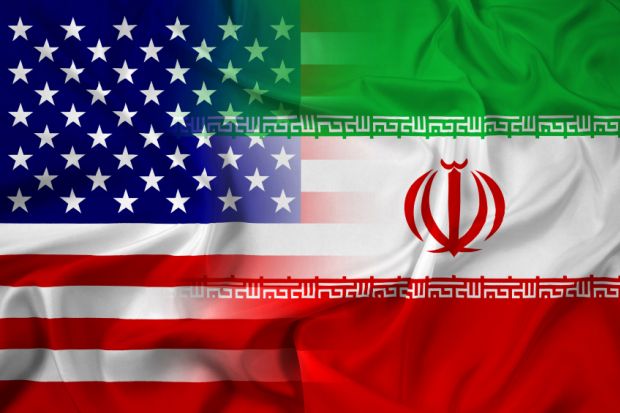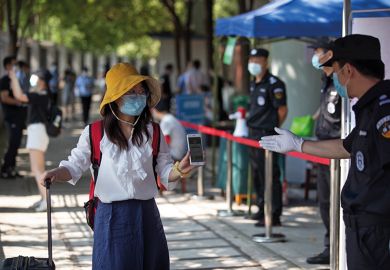By Elizabeth Redden, for Inside Higher Ed
One of the prisoners released by Iran over the weekend was Matthew Trevithick, an American researcher who was studying in an intensive language programme affiliated with the University of Tehran.
The detention of Trevithick, who was held for 40 days in Iran’s Evin Prison, had not previously been publicised and US government officials gave no reasons for his imprisonment, The New York Times reported.
Trevithick was released separately from the American-Iranian prisoner swap that resulted in the release of four other Americans, including Washington Post reporter Jason Rezaian.
The prisoner releases on Saturday coincided with the implementation of the deal limiting the scope of Iran’s nuclear programme and the lifting of some American and European sanctions – developments that some international education advocates have hoped could open the way to increased faculty and student exchange.
The detention of Trevithick, however, could have a chilling effect on nascent efforts to promote increased educational collaboration.
According to a statement from his family released through the United States Institute of Peace, Trevithick is co-founder of a Turkey-based research centre, the Syria Research and Evaluation Organization (SREO), which focuses on the humanitarian crisis in Syria.
He took a leave of absence from SREO in September for a four-month intensive language programme at the University of Tehran’s Dehkhoda Institute.
Trevithick hoped, his family said in the statement, “to build on his fluency in Dari, a language closely related to Farsi that he learned while living for four years in Afghanistan”. That’s the kind of specialised training that might attract some American students to Iran.
According to the biography on his personal website, Trevithick worked as director of communications at the American University of Afghanistan from 2010 to 2014 and has also worked at the American University of Iraq.
He coached the national rowing teams for Iraq and Afghanistan (the magazine for his alma mater, Boston University, published a feature article in 2013 about Trevithick’s work as a coach and champion for the sport in the two war-torn nations).
Trevithick edited the memoir of Sharif Fayez, Afghanistan’s former minister of higher education and AU Afghanistan’s founder. He co-hosts a podcast series, Sources & Methods, which bills itself as providing a platform in which “interesting people doing interesting things get to talk about the what, how and why of what they do”.
The most recent of the podcast episodes is dated 9 December. “I apologise for being MIA on the last shows,” Trevithick said at the beginning of the episode. “I am calling in from Tehran, where I am going through an intensive Farsi language study programme at an institute inside Tehran University, and the internet here has proven difficult, to put it gently. Alongside with a few other things, it’s been a little tricky to get a good enough connection.”
Although Trevithick’s detention was previously unreported, human rights groups are monitoring other cases of students and scholars, generally Iranians, who remain imprisoned in Iran.
Among the cases that groups are monitoring is that of Omid Kokabee, who was a doctoral student in physics at the University of Texas when he was arrested during a 2011 visit with family in Iran and who is serving a 10-year prison sentence.
Amnesty International, which in mid-2014 issued a lengthy report on academic freedom issues in Iran, considers Kokabee to be “a prisoner of conscience, held solely for his refusal to work on military projects in Iran and as a result of spurious charges related to his legitimate scholarly ties with academic institutions outside of Iran”.
The Scholars at Risk Network, which is affiliated with New York University, has over the past year issued calls to action regarding the imprisonment of Hamid Babaei, a doctoral student of finance at the University of Liege, in Belgium, and Mohammed Hossein Rafiee, a retired professor of chemistry at the University of Tehran.
According to Scholars at Risk, Babaei was sentenced to six years in prison in December 2013 on charges of acting against national security by communicating with a hostile government, charges he has repeatedly denied.
“It is reported that the sole evidence for this charge is the scholarship funding which Mr Babaei received from the University of Liege as a graduate student, and that Mr Babaei had been unsuccessfully pressured to make a false confession,” the Scholars at Risk alert on his case says.
The Middle East Studies Association’s Committee on Academic Freedom wrote a letter in late December on behalf of Rafiee, the retired chemistry professor who, the committee said, has been held at Iran’s Evin Prison since June. He was sentenced to six years in prison on accusations of “spreading propaganda against the regime”.
“To this day Professor Rafiee has not been informed of the specific details of his alleged crime,” the committee’s letter states. “His family suspects that the arrest is connected to his membership in the opposition party Melli Mazhabi, as well as to the 120-page letter which he sent to President [Hassan] Rouhani in 2014, in which he expressed his support for Iran’s nuclear agreement with the United States. In this letter, he also called for the release of political prisoners, free and fair elections, and an improvement of the human rights situation in Iran.”




